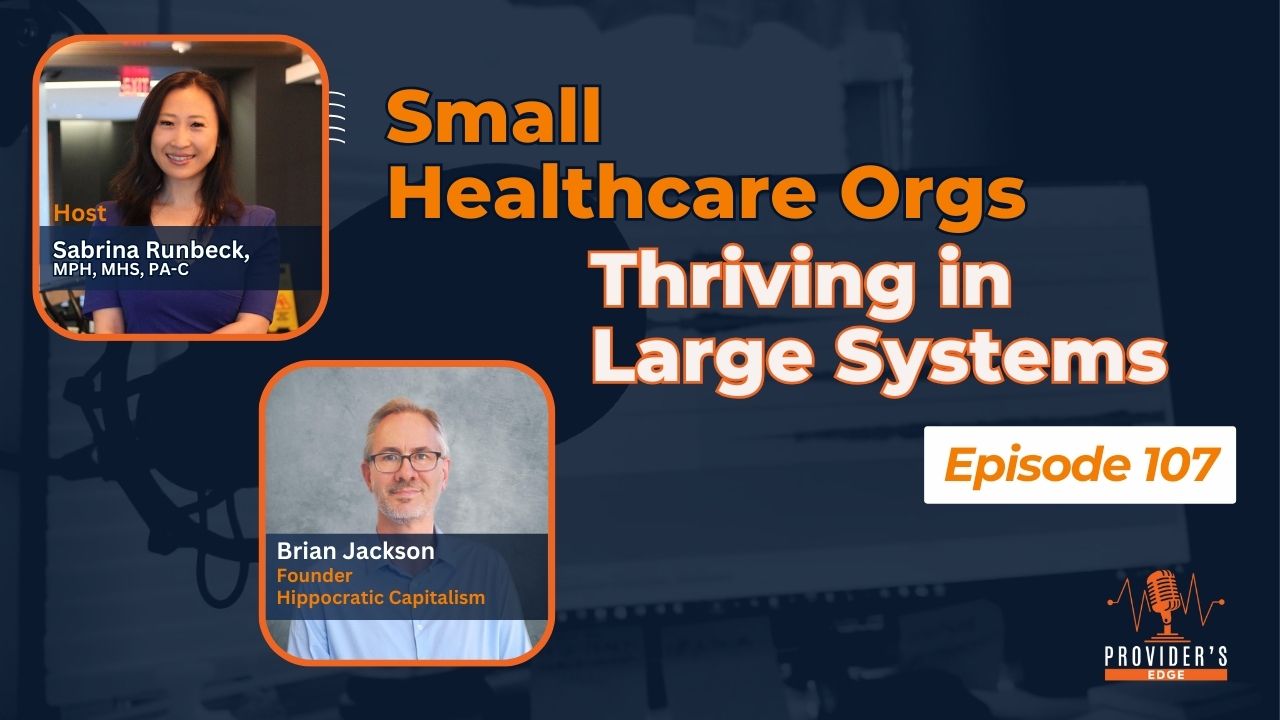
Small Healthcare Org
Thriving in Large System
Are you tired of your healthcare organization feeling lost in a sea of industrial scaling solutions? While large healthcare systems continue to dominate, smaller organizations hold a unique advantage that can lead to thriving success. Let’s explore how you can leverage these strengths to bring back the personal touch in healthcare and ensure sustainable growth.
Listen anywhere you get your podcastin' on.
Live Interview

1 The Importance of Community-Based Healthcare
“Exploring smaller community-based healthcare organizations might just be the remedy that we need to bring personality and personal touch back to the forefront of healthcare.” — Brian Jackson
Smaller healthcare organizations have a unique opportunity to reintroduce the personal touch that has been lost in the pursuit of industrial scaling. Community-based healthcare allows for more personalized interactions between healthcare providers and patients. This approach fosters stronger relationships and leads to better patient outcomes.
In larger systems, patients often feel like just another number, but in community-based settings, they receive individualized attention and care. By focusing on community ties, smaller organizations can provide a level of care that large systems often miss. Patients feel more valued and understood, leading to higher satisfaction and loyalty. This personal touch is not just a benefit for patients but also for healthcare providers who can see the direct impact of their work. They experience greater job satisfaction, knowing their efforts are making a significant difference in their community.
2 Integrating Clinical and Business Cultures
“Business management is fundamentally about organizing to get stuff done better.” — Brian Jackson
For smaller healthcare organizations, integrating clinical expertise with business strategies is essential for sustainable success. Business management is not just about finances; it's about creating efficient systems that support high-quality patient care. By understanding and applying business principles, healthcare providers can streamline operations and improve overall performance.
This integration helps in making informed decisions that enhance patient care while ensuring the organization's sustainability. Avoiding the pitfalls of bureaucracy is crucial. Smaller organizations can stay agile and responsive by minimizing layers of management and empowering frontline workers. This approach ensures that those who are most in touch with patient needs are heard and valued, leading to better decision-making and more effective care. Empowered employees are more engaged and motivated, which translates to improved patient outcomes and organizational success. Integrating clinical and business cultures ultimately creates a harmonious environment where both patient care and business objectives thrive.
3 Strategies for Sustainable Growth
The key to thriving in a large system world is focusing on human capital. Investing in your team and creating a supportive work environment fosters loyalty and enhances performance. Smaller organizations can build strong communities within their workforce, which translates to better care for patients. When employees feel valued and supported, they are more engaged and committed to delivering high-quality care.
Leveraging local community support is another powerful strategy. Smaller healthcare organizations often have deep ties to their communities. By engaging with local stakeholders and building partnerships, you can enhance your organization's support system and ensure long-term sustainability. This involves collaborating with local businesses, participating in community events, and understanding the unique needs of your community. These efforts not only strengthen your organization's reputation but also foster a loyal patient base. Strong community ties and a committed workforce are foundational elements for sustainable growth in the competitive healthcare landscape.
4 Case Studies and Examples
AUP Laboratories is a prime example of how integrating clinical and business practices can lead to success. This large testing business, part of the University of Utah, has managed to balance clinical expertise with effective business strategies, resulting in sustainable growth and high-quality care. AUP Laboratories shows how healthcare organizations can thrive by blending medical knowledge with robust business acumen, ensuring both operational efficiency and exceptional patient outcomes.
Learning from other industries can also provide valuable insights. For instance, Nucor Steel operates its steel mills as small businesses with significant autonomy. This approach allows them to stay agile and responsive to customer needs, a strategy that can be effectively applied to healthcare organizations to enhance their operations. By granting local units the freedom to make decisions, Nucor maintains high levels of efficiency and customer satisfaction. Healthcare organizations can adopt a similar model, empowering frontline teams to respond swiftly to patient needs and improve service quality.
5 Overcoming Common Challenges
Balancing innovation with tradition is essential for smaller healthcare organizations. While it’s important to adopt new technologies and methods, maintaining the personal touch that sets your organization apart is crucial. By innovating without losing sight of the human element, you can offer a unique blend of advanced care and personalized service. This balance ensures that while you are on the cutting edge of healthcare advancements, you remain connected to the core values that define your patient care approach.
Engaging all stakeholders in the decision-making process ensures that everyone involved in patient care feels valued and heard. From physicians and therapists to patients and caregivers, involving diverse perspectives leads to more comprehensive solutions and better outcomes. This inclusive approach fosters a collaborative environment where everyone works towards common goals. When stakeholders feel their input is valued, they are more likely to be committed and motivated, which enhances overall care quality and organizational harmony.
Conclusion
Smaller healthcare organizations have a unique opportunity to thrive by leveraging their strengths in community-based care, integrating clinical and business practices, and maintaining agility. By focusing on human capital, engaging with local communities, and avoiding bureaucratic pitfalls, you can ensure sustainable growth and high-quality care for your patients.
“Healthcare doesn't really work well with a factory mindset.” — Brian Jackson
Are you ready to take your smaller healthcare organization to the next level? Embrace these strategies and watch your organization thrive in a large system world. What challenges have you faced in balancing innovation with tradition in your healthcare practice? Share your experiences and thoughts in the comments below.
Recommended Podcast Episodes
Did you know that the average human attention span has shrunk by nearly a quarter in just 15 years, now sitting at around 8 seconds, which is less than that of a goldfish?
Be a guest on our show
The Provider's Edge show is always looking to feature healthcare change-makers and celebrate the work they are doing to improve healthcare.
Together, we can encourage other healthcare entrepreneurs and startup founders to up-level their businesses.
If you or someone you know could be a good fit as a guest on the show, please click on the bottom below to apply as a speaker.
Healthcare Entrepreneurs!
I can help you gain visibility and credibility in the right circles so you can accelerate your mission and profitability!
After overcoming burnout working in surgery, I went back to my roots in neuroscience and public health. I learned the importance of building key human relationships with my team throughout our organization.
While helping healthcare executives and entrepreneurs to get out of the day-to-day operation of their practice, I realized I needed more visibility and more connections to reach my ideal clients.
Once I set out to be highly visible in the right circles, I was able to leverage my network of strategic partners to convert clients 5x higher than any other marketing channel I had tried previously.
Now I help healthcare change-makers to accelerate their impact and increase profitability by gaining visibility and credibility with the right strategic partners.
My clients no longer worry about where their next client is coming from, the need to plan additional budget for ads spending, or losing the ability to connect with others because their social media account is shut down.
If you want to share your social mission with the world and gain pivotal supporters that become loyal clients... then you are in the right place, with the right consultant who is also a recovered clinician.




